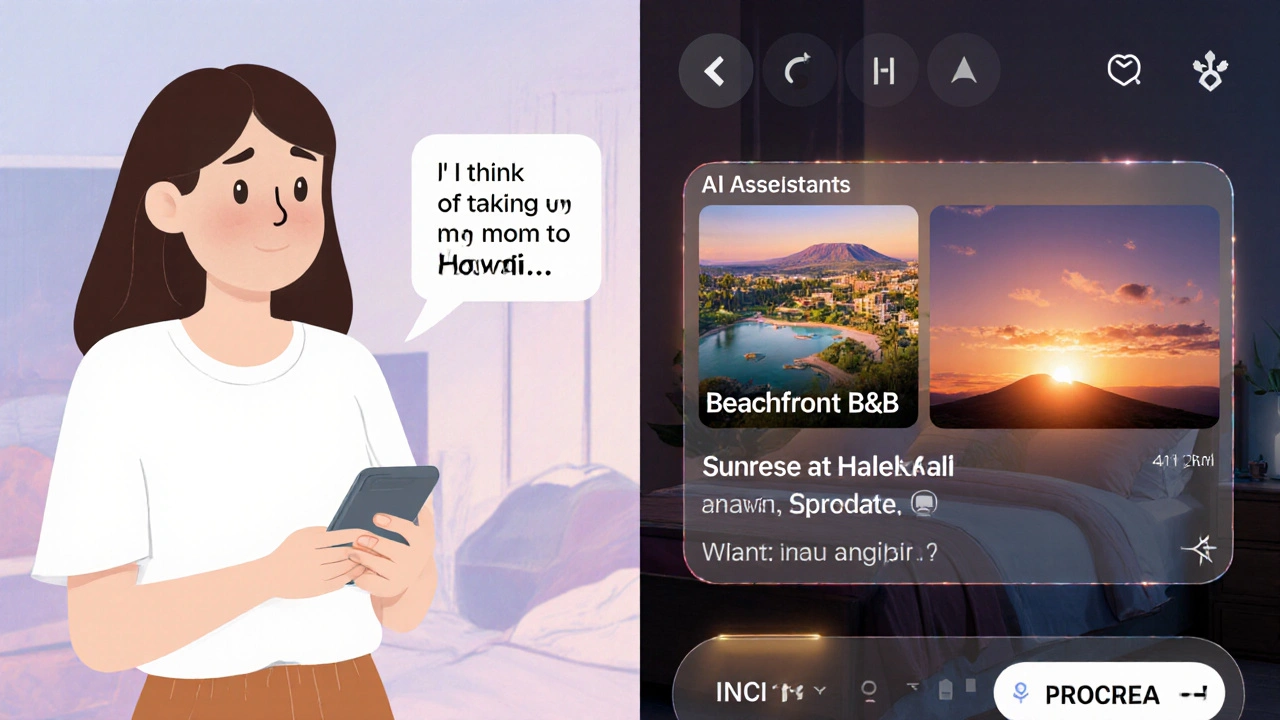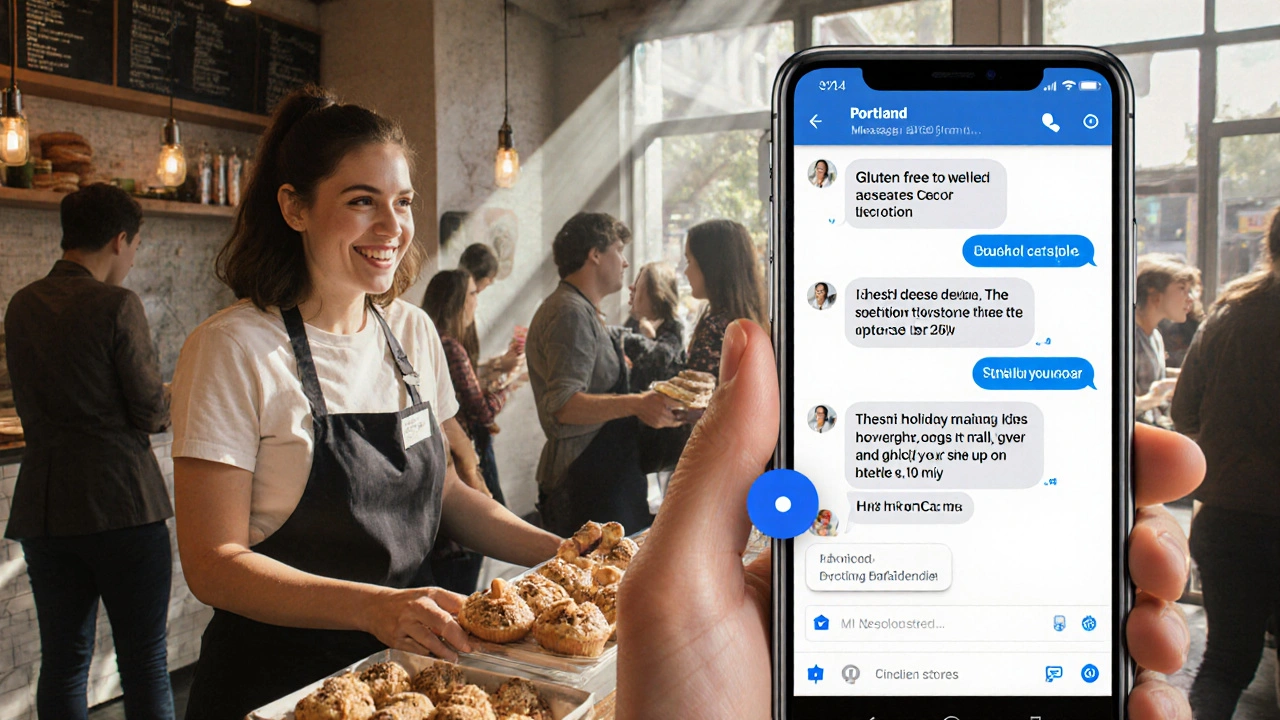How ChatGPT is Shaping the Future of Facebook Chat

Facebook Chat AI Tone Analyzer
How Facebook's AI Understands Your Messages
Test how Meta's AI analyzes tone, context, and emotional cues in your messages. This tool simulates the privacy features mentioned in the article.
AI Interpretation:
Facebook Chat used to be just a place to send texts, emojis, and maybe a quick video call. Now, it’s turning into something smarter-something that can help you write a birthday message, plan a trip, or even explain how to fix a leaky faucet. All of this is happening because ChatGPT, and the AI behind it, is quietly rewriting how people talk on Facebook.
Facebook Chat Is No Longer Just a Messaging App
Before 2024, Facebook Messenger was mostly a tool for personal conversations. People sent memes, checked in with friends, and occasionally used it for customer service. But in early 2025, Meta rolled out AI-powered features directly into Messenger, powered by models similar to ChatGPT. These aren’t just chatbots that answer FAQs. They’re conversational agents that remember your preferences, adapt to your tone, and even suggest replies based on your past messages.
Imagine typing, “I’m thinking of taking my mom to Hawaii for her birthday.” Instead of just sending a link to flights, the AI responds: “She’d love the Haleakalā sunrise. I found a 4-star beachfront B&B with free breakfast. Want me to check availability for next month?” That’s not a pre-programmed response. That’s real-time understanding-something ChatGPT-style models make possible.
How ChatGPT’s Technology Is Being Integrated
Meta didn’t build its AI from scratch. It licensed core language model technology from OpenAI and fine-tuned it for Facebook’s ecosystem. The result is a version optimized for casual, emotional, and context-rich conversations. Unlike the original ChatGPT, which was trained on broad internet text, Meta’s model was trained on billions of real Messenger conversations-plus public posts, comments, and even profile bios.
This means the AI understands things like:
- When someone is being sarcastic
- What “lol” means in your friend group
- That “I’m fine” might actually mean “I’m not fine”
It doesn’t just respond-it listens. And it learns. Every message you send helps it get better at predicting what you need next. That’s why users report feeling like they’re talking to someone who truly knows them.
Real-World Use Cases People Are Already Using
People aren’t just experimenting with this feature-they’re relying on it.
Parents use it to draft thoughtful birthday wishes they can’t find the words for. One mother in Ohio told a tech blog, “I used to spend 20 minutes rewriting messages. Now I type ‘tell Emma I’m proud of her’ and the AI gives me three options. I pick one and send it. Done.”
Small business owners use it to reply to customer messages without hiring extra staff. A bakery in Portland now has its Messenger AI answer questions about gluten-free options, pickup times, and holiday orders. Their response time dropped from 4 hours to 12 seconds.
Teens use it to navigate awkward conversations. “I asked it how to tell my crush I like them without sounding weird,” said a 16-year-old in Chicago. “It gave me three versions-one funny, one simple, one emotional. I picked the funny one. It worked.”
These aren’t edge cases. They’re everyday behaviors. Meta’s internal data shows that 42% of daily Messenger users now interact with the AI at least once a week.

The Shift From Text to Task
Facebook Chat is no longer just about exchanging words. It’s becoming a task engine.
Ask the AI to “find me a dentist near me who takes my insurance,” and it pulls up local providers, checks your plan, and even books a consultation. Ask it to “remind me to call Mom next Sunday,” and it adds the reminder to your calendar and sends you a nudge.
This is the biggest change: Facebook Chat is becoming a personal assistant. It doesn’t wait for you to open another app. It’s right there in the conversation you’re already having.
Compare that to how it worked five years ago. Back then, you’d open Facebook, send a message, then open Google Maps, then open your calendar, then open your phone app to make a call. Now? You say it once, and the AI does the rest.
Privacy Concerns and How Meta Is Handling Them
Of course, not everyone is excited. Some users worry about what happens to their messages.
Meta says all AI interactions are optional. You have to turn the feature on. Once enabled, you can review and delete your AI conversation history at any time. Messages aren’t used to train public models. They’re processed locally on Meta’s servers using a privacy-first design called “Federated Learning,” which means your data doesn’t leave your account unless you say so.
Still, skepticism remains. A 2025 Pew Research survey found that 58% of U.S. adults are uncomfortable with AI reading their private messages-even if it’s for “help.” Meta responded by adding a visual indicator: every AI reply now has a small blue dot and the label “AI Assistant.” No hidden messages. No surprise responses.

What This Means for the Future of Social Media
If Facebook Chat can understand your mood, remember your plans, and help you act on them-all in real time-what does that mean for the rest of social media?
It means the line between communication and action is disappearing. Soon, you won’t just post about your vacation-you’ll ask the AI to book it. You won’t just comment on a friend’s job post-you’ll ask the AI to help you write a referral. You won’t just scroll through memes-you’ll ask the AI to explain why they’re funny.
This isn’t science fiction. It’s happening now. And it’s not just Facebook. Instagram DMs, WhatsApp, and even LinkedIn messages are following the same path. The future of social media isn’t just about sharing-it’s about doing.
Why This Matters for Everyone
You don’t have to be a tech expert to feel the impact. Whether you’re a teenager learning to communicate, a parent juggling family life, or a small business owner trying to keep up, this AI is changing how you connect.
It’s making conversations more helpful. More efficient. More human-even when the helper isn’t.
But here’s the real question: Are we letting AI help us talk better… or are we slowly letting it do the talking for us?
Is ChatGPT directly powering Facebook Chat?
Meta uses AI technology inspired by ChatGPT, but it’s not the same model. Facebook Chat runs on a custom version trained specifically on Messenger data, not OpenAI’s public model. It’s optimized for casual, emotional, and context-aware conversations-things like remembering your friend’s birthday or understanding sarcasm in text.
Do I have to use the AI in Facebook Chat?
No. The AI assistant is completely optional. You have to turn it on in your settings. Even after enabling it, you can disable it anytime. Every AI reply is clearly labeled, and you can delete your conversation history with it at any time.
Can the AI read my private messages?
The AI processes your messages to respond, but it doesn’t store them permanently or use them to train public models. Meta uses a privacy system called Federated Learning, which keeps your data tied to your account. You can review and delete all AI interactions anytime. Messages are not shared with advertisers or third parties.
Is this feature available worldwide?
As of late 2025, the AI assistant is available in over 80 countries, including the U.S., Canada, the U.K., Australia, Germany, and Brazil. It’s rolling out gradually in regions with lower internet speeds or where language support is still being improved. If you don’t see it yet, it should appear in your app update over the next few months.
Will this replace human customer service on Facebook?
Not entirely. The AI handles simple, repetitive questions-like order status or store hours. But if your issue is complex, emotional, or requires empathy, the system automatically connects you to a human agent. Most businesses using the AI still keep at least one person on standby for tricky cases.
Can I turn off the AI for certain contacts?
Yes. You can create a list of people you don’t want the AI to respond to. For example, if you’re chatting with your therapist or a close family member, you can set those chats to stay human-only. The AI will never interfere unless you allow it.
What Comes Next?
The next step? Voice-powered AI in Messenger. Meta is testing a feature where you can speak naturally-“Hey, tell Sarah I’ll be late”-and the AI sends the message in your voice tone, with natural pauses and emphasis. It’s not just typing anymore. It’s talking.
And soon, it might even predict what you want to say before you say it. Imagine opening Messenger and seeing a suggestion: “You’ve been talking about your dog’s vet visit. Want me to book it?”
This isn’t about replacing human connection. It’s about removing friction. The goal isn’t to make Facebook Chat smarter. It’s to make it feel more like a friend who remembers everything-and never forgets to ask how you’re doing.



